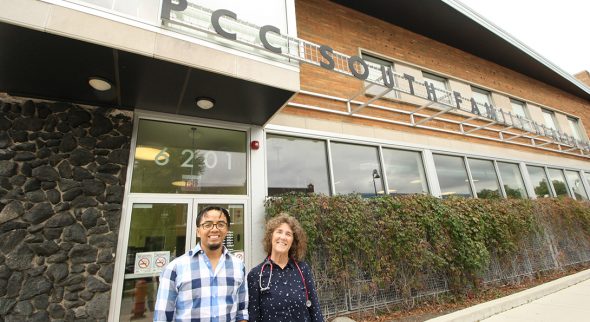$2.7M grant gives nurse practitioner students immersive clinical experience

By Deborah Ziff Soriano
Five years ago, as then-director of the UIC Nursing Family Nurse Practitioner program, Charles Yingling noticed that nurse practitioner students who wanted careers in community health were facing a steep learning curve.
Once or twice per semester, they were rotating to a new site for their clinical experience, spending critical time learning new computer systems, rules and facilities, instead of immersing themselves in learning how to care for patients.
So Yingling, who is also a family nurse practitioner at Chicago-based federally qualified health center PCC Community Wellness Center, decided to try something new. With the help of a colleague, he set up a program called the Community Health Immersion Clinical (CHIC), a yearlong, longitudinal experience where students get assigned to a home clinic within one of PCC’s 12 health centers and rotate to other service lines, such as oral health, psychiatric-mental health and sports medicine.
“We build students’ confidence fast because they’re seen as integral members of the team,” said Yingling, now interim associate dean for practice and community partnerships at UIC Nursing. “They’re known and trusted. And the majority of them get hired at PCC or at another community health center.”
Now, UIC Nursing will be able to take that concept and expand it. A program called PracticeReady, funded with nearly $2.7 million from the U.S. Health Resources & Services Administration, will place UIC family nurse practitioner (FNP) and psychiatric-mental health nurse practitioner (PMHNP) students in immersive, two-to-three-semester clinical experiences within community health settings.
In addition to PCC, the college is partnering with three more providers in Illinois that reach underserved and rural populations: the University of Illinois Hospital & Health Sciences System-Mile Square Health Center, Freeport Health Network and Access Community Health Network in Chicago.
Why it’s needed
The program is especially crucial because the U.S. faces a shortage of primary care practitioners, according to the Henry J. Kaiser Family Foundation, with an estimated 483 health professionals needed to fill the gap in Illinois. Nurse practitioners are key to solving this primary care crisis, Yingling said.
“Our reason for being is to provide health care for the most vulnerable populations of Chicago,” said Paul Luning, MD, MPH, chief medical officer at PCC Community Wellness. “We believe being a health care provider for those patients is not something everybody can do. There’s benefit to being trained by attending-level providers who know what they’re doing with the specific needs of that patient population.”
Through the program, 20 UIC Nursing family and psychiatric-mental health nurse practitioner students will be selected in each year of the four years of the grant and placed at one of the four practice partners. The students will receive traineeship funding, which will cover their tuition for fall and spring semesters. The practice sites also will receive funding through the grant, which will allow them to designate clinicians to serve as clinical practice leaders for the students.
Telehealth will be integrated into the clinical preparation of trainees. The students are expected to have frequent interactions with one another, which is important because more than half of primary care patients have a co-occurring mental health concern, Yingling said.
